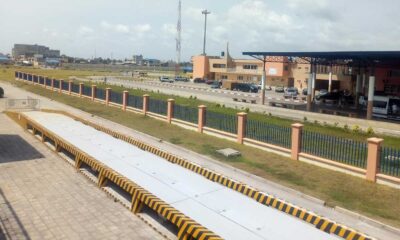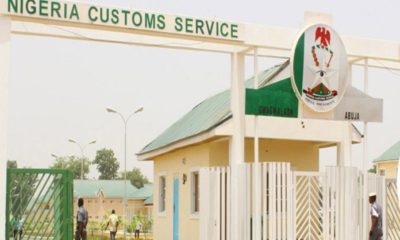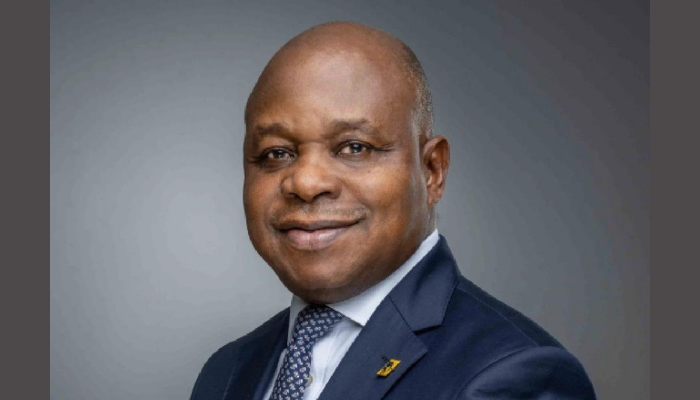- Customs Want 35% Levy on Vehicle Importation Reduced
The Comptroller-General of Customs, Col Hameed Ali (retd.) has called on the Federal Government to reduce the 35 per cent levy on imported vehicles so as to check the rising cases of smuggled vehicles into the country.
Ali said this on Wednesday in Abuja at the unveiling of a Strategic Revenue Growth Initiative which was held at the Ministry of Finance.
He said already the Nigeria Customs Service had made a proposal to the Ministry of Finance on the need for a reduction in the 35 per cent levy on imported vehicles.
Ali said currently, any new vehicle imported into the country attracted an import duty of 35 per cent and an additional levy of 35 per cent.
This, he noted, brought the total duty payable on such a vehicle to about 70 per cent.
He described the 70 per cent being charged by the government as high, adding that time had come for it to be reduced.
In achieving this, he said, the government could still retain the 35 per cent import duty while the additional 35 per cent levy could be tinkered by bringing it downwards.
He said, “First, we must understand the fact that smuggling in most cases did not really occur because of the tariff that is placed on goods in Nigeria.
“When we talk about vehicles, yes, new vehicles attract 70 per cent duty; that is 35 per cent duty and 35 per cent levy but most of the vehicles that are being smuggled through our borders are not new vehicles, they are used vehicles.
“And the value is calculated based on the year of make and other attributes. So, the motivating factor that gets people to move these goods to our neighbouring countries is with the sole aim of smuggling them into Nigeria.
He added, “The 35 per cent is a baseline which is the duty, but the 35 per cent levy is what we think should be tinkered with.
“We should be able to reduce that to a level that it would be affordable. 70 per cent is on the high side, there is no doubt about that for new vehicles but we cannot touch the baseline of the tax regime.”
The Minister of Finance, Mrs Zainab Ahmed, who unveiled the Strategic Revenue Growth Initiative, said that the government was concerned about the inability of some of its agencies to meet their revenue target.
She admitted that it had become a challenge for the government to mobilise fiscal resources to deliver on its developmental objectives, adding that President Muhammadu Buhari had directed that revenue generation needed to be enhanced.
According to her, while oil revenue to oil Gross Domestic Product ratio stands at about 39 per cent, non-oil revenue to non-oil GDP is about 4.2 per cent.
He said the country’s Value Added Tax revenue to GDP stood at less than one per cent, adding that this was low when compared to the ECOWAS average of 3.4 per cent.
In terms of excise revenue, she said at 4.1 per cent, revenue generated from excise duty in Nigeria was low compared to Ghana at 15.3 per cent and Kenya at 19.5 per cent.
She said, “Nigeria’s low revenue generation capabilities have been an enduring challenge to past and present governments.
“Although, we are celebrated as the country in Africa with the largest economy, translating this wealth into revenues remains a challenge.
“We have, therefore, face difficulty in mobilising domestic funds necessary for human capital development and infrastructure that are both drivers of sustainable economic growth.
“Our current revenue to Gross Domestic Product ratio of about seven per cent is unsatisfactory and we are keen on exerting all efforts in turning this around.”
Ahmed said she had tasked the Ministry of Finance and its agencies to identify what could be done to turn around the current revenue situation.
When asked when the planned increase in VAT would be implemented, the minister said a committee was currently looking at items that would be captured under the new VAT regime.
She said, “We are studying a possibility of a VAT increase but you also know that the increase of VAT requires an amendment of the law.
“First of all, the steering committee will look at the details; it is most likely the VAT increase will be selective. It will be on special items, so it won’t be across the board.
“I am sure you are already aware that there is a number of items that are VAT exempt such as food and drugs.
“There would be a VAT increase during the course of 2019; we would have clarity as to which items and what the rate would be and we would have to take a request to the National Assembly for amendment before it takes into effect.
“There is also going to be a luxury tax. Already, there is a luxury tax imposed on things like jets. There are few exceptional items that are classified as a luxury but we are contemplating increasing excise duties on carbonated drinks, just like we have excise duties now on tobacco and on alcohol.
“But this is going to be a subject of study, because we have to identify which ones would be affected and the best way to apply in which to apply the taxes.”


 Naira4 weeks ago
Naira4 weeks ago
 Naira3 weeks ago
Naira3 weeks ago


 Naira4 weeks ago
Naira4 weeks ago




 Naira3 weeks ago
Naira3 weeks ago
 Commodities4 weeks ago
Commodities4 weeks ago


 Sport Business4 weeks ago
Sport Business4 weeks ago


 News3 weeks ago
News3 weeks ago


 Banking Sector4 weeks ago
Banking Sector4 weeks ago

















